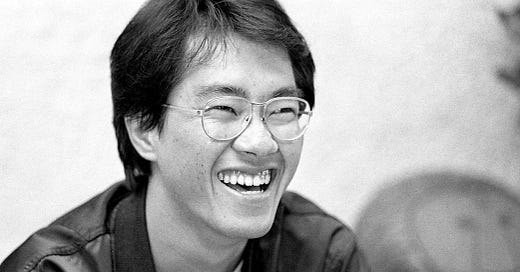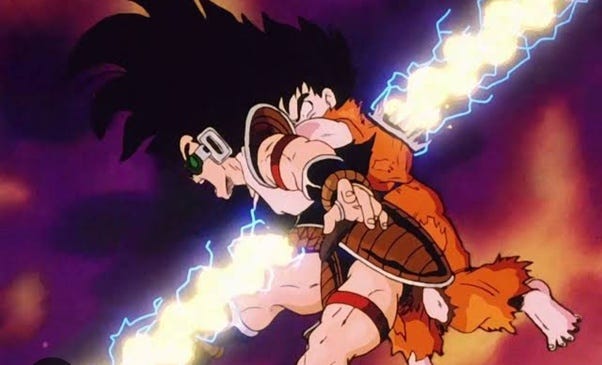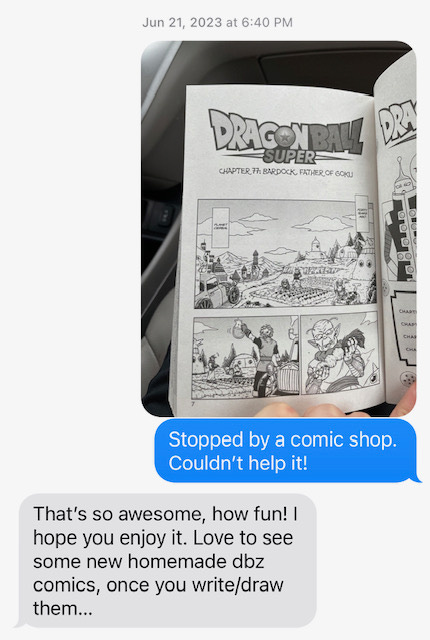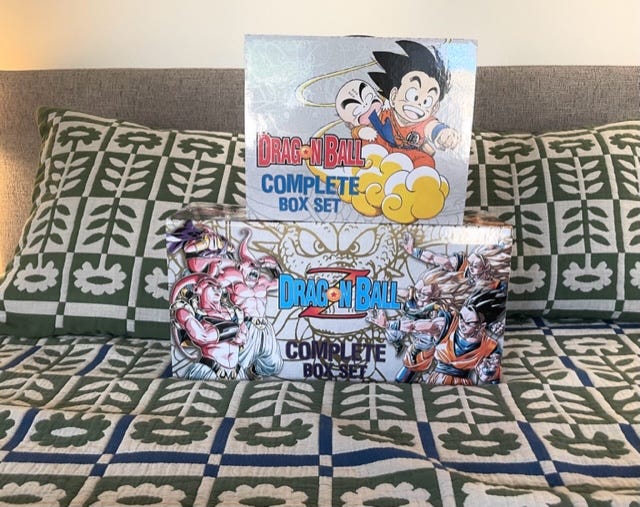Akira Toriyama Was A Man
But for years the creator of Dragon Ball seemed like a god to me.
Good morning.
Today’s post is a culture essay. If you’re not into it, no harm in skipping. I won’t hold it against you. Thanks again for subscribing and reading.
I.
The Japanese animator Akira Toriyama died on March 1, 2024 at the age of 68.
Most of you will have heard of Akira Toriyama but there’s probably a few who haven’t. His work was known by millions and possibly even billions of people worldwide.
That’s because he was the man who created the Dragon Ball series which has run, off and on, in various incarnations (Dragon Ball, Dragon Ball Z, Dragon Ball GT, Dragon Ball Z Kai, Dragon Ball Super) up until his death earlier this year. If you’re not familiar with the Dragon Ball series, it basically tells the story of a boy named Goku growing over time to eventually become the most powerful being in the universe. If you had to ask what Dragon Ball was about, the simplest answer would be “getting more powerful.”
It remains to be seen if it will continue now that Toriyama has passed away.
Even though Toriyama died over three months ago, I hadn’t really reflected on his passing until recently.
At Artsy, a co-worker of mine taught me the term “visual culture.” I’d never thought about the idea of studying culture based on its visual expression. We built an entire coverage area around that idea.
To my mind, Akira Toriyama had perhaps the largest impact on visual culture in the late 20th and early 21st centuries. To be honest, he’s probably the most important visual artist in my lifetime.
I’m not sure his legacy in animation is greater than Walt Disney’s (regardless of how you think of Walt Disney the person) but he should be considered one of the most important animators of all time.
And now he’s dead.
II.
My grandmother, my mother’s mother whom we called Nana, lived in an over-55 community called Snug Harbor in Amityville, New York for about twenty years. Sometimes, my sister and I spent a night or weekend there.
On one of these trips, in 1996 when I was 10 or 11 years old, I was sitting on my grandmother’s bed on Sunday morning watching TV while my sister and I waited for our parents to get us. My grandmother’s bed was tall, so you could sit on the edge and look directly at the square black TV that sat on the heavy wooden dresser opposite the end of her mattress.
I happened to switch to channel 11, which was a local station called WPIX that had become an affiliate of Warner Brothers (“the WB”). On the channel was a cartoon. It immediately struck me. Why? Because I saw two men being shot through with a corkscrew laser beam that was shot from another guy’s finger tip.
I stared at the screen and watched as the episode ended. As the credits played, I felt something strange. To this day, I can’t describe it. It’s the feeling of learning, through a song or a movie or any other piece of culture, that your DNA, your entire being has changed.
I expected a normal cartoon to come on next but I was shocked when an opening credits sequence for the same show seemed to be starting.
I watched another episode of this show—Dragon Ball Z—and learned that one of the guys that got run through with a corkscrew laser beam was named Goku and that he was the hero of the show. He wasn’t dead after all. In fact, he could go to the afterlife and train and become more powerful and eventually be brought back to life by the Dragon Balls.
When my parents brought me home, I checked the TV guide in the newspaper to see if Dragon Ball Z aired the next Sunday morning. Sure enough, it did. In fact, it aired for one hour every Sunday morning on WPIX.
I was hooked on Dragon Ball Z. And I watched as Goku defended the Earth from Nappa and Vegeta, the Saiyan warriors who had come to rid the planet of all human life. I learned that Goku was one of these Saiyan warriors as well. In fact, he’d been sent to destroy humanity as a baby. The only catch? He’d hit his head on a rock as a child, got amnesia, and become pure good instead of pure evil.
Now how could a ten- or elevn-year-old kid not fall in love with a story like that?
III.
Something strange happened one Sunday though.
The Dragon Ball Z story had reached a point where Goku and his friends had barely defeated Vegeta (Goku had killed his partner Nappa) but Goku, out of the goodness of his heart and a desire to get a second chance at fighting a strong opponent, had allowed Vegeta to escape.
It seemed like the story would enter an exciting new chapter. Except the second episode that day seemed to be totally disconnected from the previous episode. In fact, it seemed like the story had been entirely reset from the beginning!
What I learned was that there were no new translated episodes of Dragon Ball Z to air in the United States. I would have to rewatch the story again until new episodes were translated and ready to run.
I don’t know how I acquired this information at the time—it’s now mixed with the accumulated knowledge I have of Dragon Ball’s history. But I must have learned it somehow (probably from the internet) because I can remember how devastated I was.
So I turned to the internet. Back then we had CompuServe and I would log on and search whatever websites were around then in order to get more Dragon Ball Z.
I learned that the entire story had already been written and released in both manga and anime form in Japan. I’d find websites with counters and cool little animated GIFs of Dragon Ball characters taken from Japanese video games that showed characters that I’d never seen before in any episodes.
At some point, I learned how to find forums where people shared Dragon Ball fan fiction. And through those I was able to download translated versions of the manga.
I can recall, vividly, sitting at my family computer and waiting for single pages of the manga to load. Remember, this was 1996-1997. But I persisted and was able to read the entire Dragon Ball series in manga form a single page at a time on my computer.
When my family and I went into New York, we would stroll Chinatown and I’d look in shops for Dragon Ball Z figures. There weren’t many in the United States at the time and they were expensive. I remember my parents letting me buy one though.
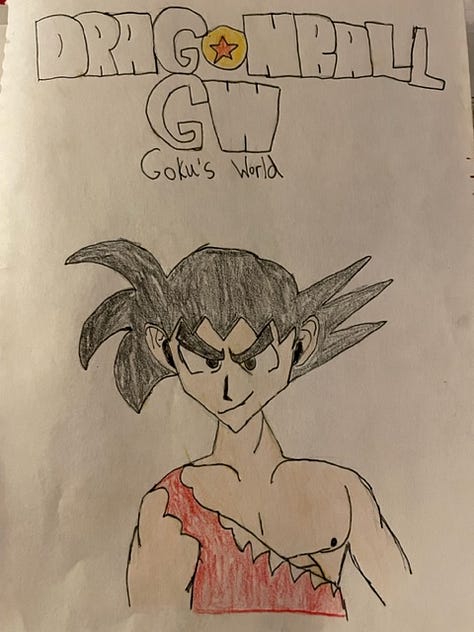
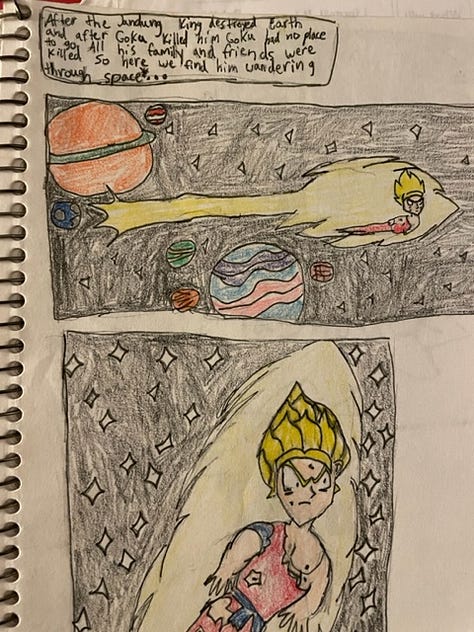
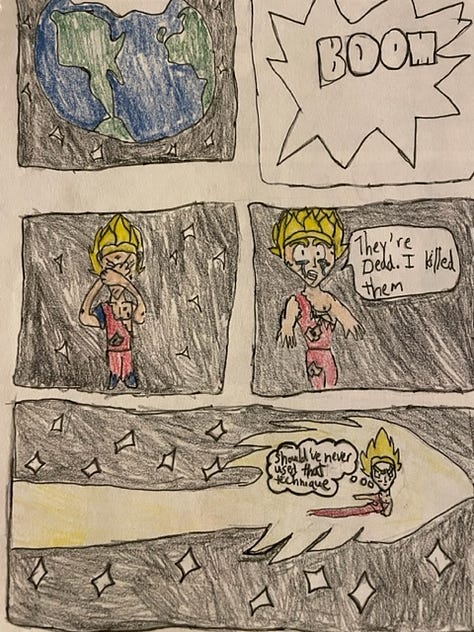
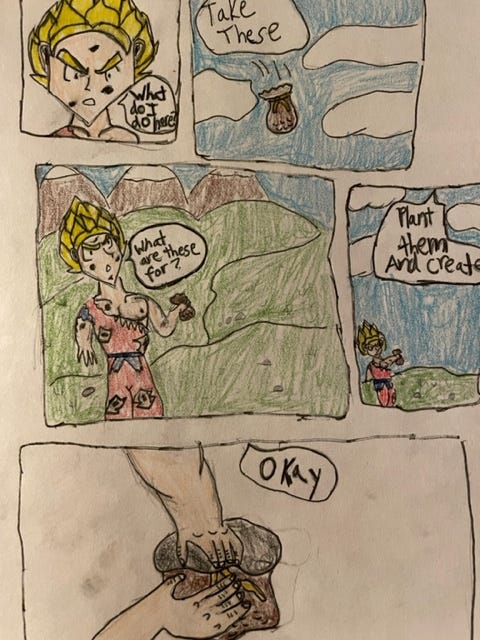
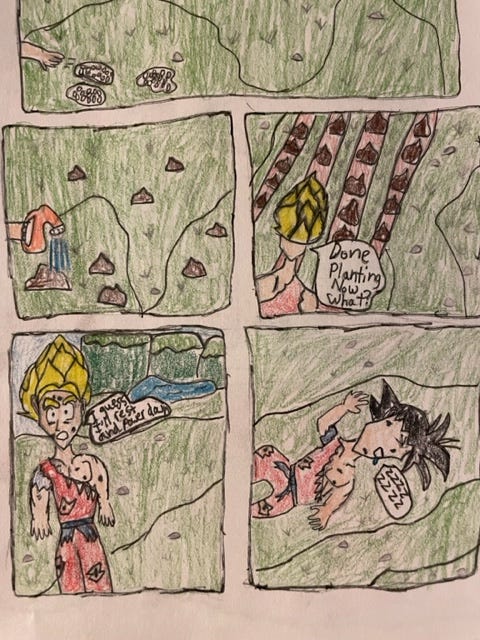

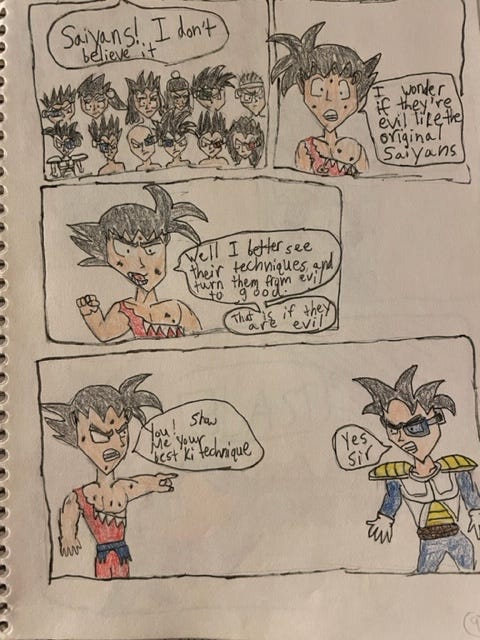
Back then I used to think I might be an artist or an animator. I’d spend hours drawing Sonic the Hedgehog and Dragon Ball Z characters. I’d even eventually start creating my own fan fiction comics. Each and every one started, but unfinished.
At this time, I also began watching Sailor Moon in the mornings before school. This was both a way to get an anime fix and talk to girls. Sailor Moon wasn’t the same as Dragon Ball Z (not even close) but it filled the hole in my heart.
Eventually, Dragon Ball Z came back and I was able to watch the next tranche of translated episodes. But eventually that tranche ran out and I learned, this time I’m pretty sure from the internet, that Funimation and Saban (the companies that worked together to bring dubbed Dragon Ball Z to the United States) had stopped working together and that the rest of the series would not be dubbed and brought to TV in the United States.
IV.
I was crushed.
But this was 1997 or 1998. I couldn’t go on Twitter and complain about it. Instead, I accepted the Pokemon craze that had risen in the United States.
My friends, who looked at me like I was insane when I told them about Dragon Ball Z, now all had the Pokemon game for Game Boy and watched the cartoon before school.
Don’t get me wrong, Pokemon was cool. In fact, I still love Pokemon. There’s a Pokemon store in the Barton Creek Mall in Austin and every time I pass by it I have some animal instinct to rush and go in. Catch me on a good day and I can still name a good chunk of the original Pokemon evolution chains.
But Pokemon was not Dragon Ball and it never would be.
However, one day in 1998 something that seemed like a miracle happened. Cartoon Network, which had begun to air more anime in a cartoon block called Toonami, announced they would be bringing the entire translated Dragon Ball series to the air—they’d be resuming the series from where it stopped off and also catching new viewers up from the beginning.
I can remember counting down the days until Dragon Ball Z would come back on the air. And I can remember gathering with friends at my friend Jeff’s house to watch Goku fight the Ginyu Force during the heart of the Frieza Saga. None of that will make any sense to a lot of you, but trust me—this was extremely exciting.
With Dragon Ball airing on Cartoon Network, a whole generation of young Americans was introduced to and fell in love with the series and the characters. That was the point where most of my friends became familiar with the show even though none of them loved it as much as I did.
V.
But, of course, I got older.
At the moment the series entered American popular culture and you could buy installments of the manga and also action figures of the characters at the mall, I stopped caring as much about Dragon Ball.
Instead, it became something that defined a specific period of my life that had passed—a time when professional wrestling and anime were the parts of pop culture, and really life, that meant basically everything to me.
That was soon to be replaced by music, books, writing—and of course girls and probably trying a few substances a little earlier in life than I most likely should have.
I watched as Dragon Ball begat famous internet memes and I saw t-shirts out in the world. For years, I had felt like the one person in my town and small part of the world that loved it. But now I saw how much it belonged to the world.
During the next twenty years or so, Dragon Ball became a kind of shorthand with one of my closest friends. During those twenty years, there were periods when we were close and then far apart. It is still that way even though we love each other deeply—in a way you love a sibling. No matter any kind of distance between us, the bridge could always, always be Dragon Ball.
In fact, this friend actually kept up with the series when they began releasing new manga issues and anime episodes of the latest series of Dragon Ball, Dragon Ball Super, in 2015.
Whereas I had once relayed the existing Dragon Ball mythology to my friend, my friend now relayed the new, unfolding in real time, story lines to me whenever we happened to see each other.
When Akira Toriyama died, I saw this friend tried to call me. We didn’t get a chance to connect at that moment. And I wish we would have so we could have talked about how much Akira Toriyama’s work meant to the two of us and the way it connected us over time. The way it added another layer to our friendship, once that let us communicate with each other even when we weren’t sure exactly, maybe, how to actually communicate.
VI.
In the year before Toriyama’s death, I started to crave Dragon Ball again.
Maybe it had to with the fact that I had uprooted myself from New York City after fifteen years and relocated to Austin. Maybe it was the fact that I was living in my fiancee’s childhood bedroom in her parents house for seven months and saw her rediscovering old notebooks and fascinations from her childhood.
Or maybe I just wanted to fall deeply into something again, the way I once could as a child.
One day after we went to our trainer, my fiancee and I stopped by Austin Books and Comics and I picked up an manga issue of Dragon Ball Super. I had no idea what was going on in the larger story but I loved every minute of every frame I read.
So I went online and bought the entire box set of Dragon Ball Z manga. I greedily opened it when it arrived and read all 26 volumes in the course of a week. I took a little break and then ordered the box set of the original Dragon Ball right before the holidays. Once again, I greedily opened that set when it arrived and read all 16 volumes in the course of a week. Some evenings when I went to bed, I would see Dragon Ball manga panels flash across my mind’s eye as I drifted to sleep.
I started frequenting the DBZ subreddit in my idle moments and also when I needed solace after a devastating loss suffered by the Philadelphia Eagles, Phillies, or Sixers. And there, day after day, I saw fans litigating and re-litigating moments from the series. I saw fans asking unanswerable questions about characters and their motivations at specific moments in the series as well as “what if” moments in the story that had probably been asked in forums for nearly 30 years.
After Akira Toriyama died, I decided to read the entire series from the beginning to the end. I just completed that journey, a little more slowly this time, two weeks ago.
During that time, I also started watching the original Dragon Ball anime in Japanese on Hulu. Hulu has the entire Dragon Ball series in various forms if you ever feel like watching it.
The fact that any part of Dragon Ball is so easily accessible is somewhat astounding to me. For so many years, I had to wait and search for any scrap of this thing I loved. I had to draw and make up stories for myself in order to replicate the feeling of the real thing. Now, I can find every episode on a streaming service and order every volume of the manga to my home in 24 hours. Part of that is obviously amazing, but part of me feels as if I learned something important in all the waiting and searching I had to do nearly 30 years ago.
In watching the original Dragon Ball anime while also reading the manga for the second time in four months, I also fully grasped how talented Akira Toriyama was. He took a story that was a very funny and slapstick (and, yes, sometimes inappropriate and problematic in some places) adventure story about a young boy who was good at martial arts into an intergalactic opera about achieving the ultimate form of power in the universe that people around the globe.
The original Dragon Ball is truly funny—especially the anime in the original Japanese. There is a simple charm in a winking story, well told that I could’ve never really appreciated as a boy. And Dragon Ball Z remains thrilling. Once the action is rolling, you can not stop turning the page.
What I cherish now the most about these stories is that I will always have them. I may be able to show them to my children. And if they don’t care, it doesn’t matter, I’ll still have my boxed sets tucked back in my closet ready to read when I need to remember what it was like to fall so deeply into a world that I never want to leave it.
VII.
I am no longer moved by celebrity deaths. I no longer feel the loss of my cultural heroes.
It’s not that I don’t empathize or feel sad, but I’ve reached a point emotionally where I understand that everyone you love or who has brought you joy in some form or another will disappear or die. I may not always fully comprehend this, but I know now that it is the the joy and depth of feeling you were able to receive from those people that will remain and never die or disappear.
Yet, something about Akira Toriyama being gone is jarring to me. Perhaps it's because, for me, he almost never really existed.
I never knew anything about his life and never really explored any of his work outside of Dragon Ball. All I cared about was Dragon Ball.
In a strange way, to me, Akira Toriyama was not really a person at all. He was closer to a god or some kind of spirit who delivered the tale of Dragon Ball out of the air and bestowed it upon the world. I didn’t know how he made the story up as he went along, ignored previous character details, and retconned parts of the narrative.
Because I learned about it when I was ten or eleven years old, Dragon Ball always existed and would always exist. Akira Toriyama always existed and would always exist.
The reality is that Akira Toriyama wrote Dragon Ball around the time my parents had me. He kept up with the demand for his characters and story while my parents were raising my sister and I. He finished (at that time) the entire story before I reached the age of ten.
The reality is that Akira Toriyama died this March at the age of 68. The same age both of my parents turn later this year.
So he was a man, a person, just like any other. And he died. And perhaps that means any future stories from the world of Dragon Ball will cease. I’m sure there is a kid out there that will be devastated at the prospect of not seeing the story continue.
I can only hope that kid will realize the stories will always be there, that they get better with time, and that time can never change the way Toriyama’s characters and art altered the very fabric of that kid’s being.
